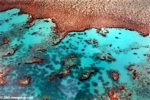Tiny marine algae, known as phytoplankton, are the backbone of the marine food chain, yet a new study in Nature has found that this backbone is disintegrating. Researchers discovered that since 1950 phytoplankton has declined by approximately 40 percent across the Northern Hemisphere, a decline that corresponds to warming waters due to climate change. Given that these microscopic plants feed the oceans’ abundance all the way up the food chain—from zooplankton to fish to seabird to sharks to humans—the decline has likely impacted the very structure of the ocean.
“Phytoplankton are a critical part of our planetary life support system. They produce half of the oxygen we breathe, draw down surface CO2, and ultimately support all of our fisheries. An ocean with less phytoplankton will function differently, and this has to be accounted for in our management efforts,” explains co-author and associate professor, Boris Worm, from Dalhousie University.
Employing both historical records and contemporary data, researchers were able to compile a database with half a million observations in order to recreate the oceans’ phytoplankton populations going all the way back to 1899. In doing so they discovered a continuing decline of around 1 percent of the global average every year. Since the declines were linked to rising temperatures, researchers say that warmer oceans restrict the abundance of nutrients delivered from the deep to the surface. Since such nutrients are essential for phytoplankton production, less nutrients equals less phytoplankton.
“Climate-driven phytoplankton declines are another important dimension of global change in the oceans, which are already stressed by the effects of fishing and pollution,” explains co-author Marlon Lewis, also from Dalhousie University.
According to a number of prominent marine scientists, the oceans are in full-scale crisis. Climate change is leading to more acidic oceans threatening the world’s coral reefs, the most diverse ecosystem in the oceans. In addition overfishing has decimated many top predators, overturning food chains and emptying ecosystems, while pollution, from plastic to oil, are killing charismatic species, such as sea turtles, sea birds, and marine mammals. Nutrient runoff from agricultural fertilizers and sewage are leading to a dramatic increase in oceanic dead zones, where species are essentially starved of oxygen.
Related articles
Coral reefs doomed by climate change

(07/22/2010) The world’s coral reefs are in great danger from dual threats of rising temperatures and ocean acidification, Charlie Veron, Former Chief Scientist of the Australian Institute of Marine Science, told scientists attending the Association for Tropical Biology and Conservation meeting in Sanur, Bali. Tracing the geological history of coral reefs over hundreds of millions of years, Veron said reefs lead a boom-and-bust existence, which appears to be correlated with atmospheric carbon dioxide levels. With CO2 emissions rising sharply from human activities, reefs—which are home to perhaps a quarter of marine species and provide critical protection for coastlines—are poised for a ‘bust’ on a scale unlike anything seen in tens of millions of years.
Amazing reefs: how corals ‘hear’, an interview with Steve Simpson

(07/21/2010) Corals aggregate to form vast reefs, which are home to numerous species and provide vital ecological services such as protecting shorelines. However, coral reefs are one of the most threatened ecosystems in the world due to many factors, such as global warming and ocean acidification. Recent research by Simpson and his team of scientists has shown that corals, rather than drifting aimlessly after being released by their parent colonies and by chance landing back on reefs, instead find their way purposefully to reefs by detecting the sound of snapping shrimps and grunting fish on the reef. However, that discovery also means that the larvae might struggle to find reefs when human noises, like drilling or boats, mask the natural ocean sounds.
In the midst of marine collapse will we save our last ocean?

(07/05/2010) Imagine an ocean untouched by oil spills: a sea free of pollution, invasive species, dead zones, and over-exploitation; waters where marine animals exist in natural abundance and play ecological roles undimmed by mankind. Such a place may sound impossible in today’s largely depleted oceans, but it exists: only discovered in 1841, the Ross Sea spreads over nearly a million kilometers adjacent to the Antarctic continent. Here killer whales, penguins, sea birds, whales, and giant fish all thrive. However, even with its status as the world’s ‘last ocean’, the Ross Sea has not escaped human impact. Over the last 15 years commercial fisheries have begun to catch one of its most important species in the ecosystem to serve them up on the dinner plates of the wealthy.